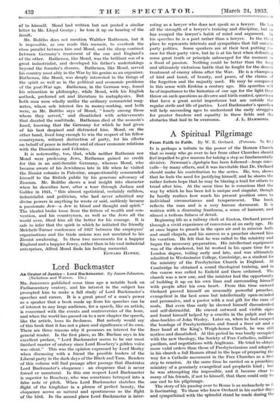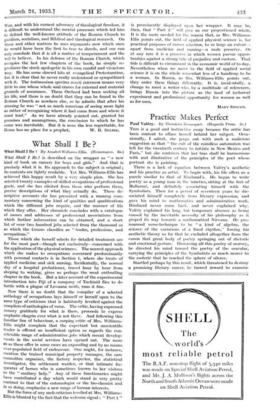A Spiritual Pilgrimage
From Faith to Faith. By W. E. Orchard. (Putnam. 7s. 6d.)
IT is perhaps a tribute to the power of the Roman Church that so many who go over to her from other Churches should feel impelled to give reasons for taking a step so fundamentally divisive. Newman's Apologia has been followed—longo inter- vallo—by many others, and it was inevitable that Dr. Orchard should make his contribution to the series. He, too, shows that he feels the need for justifying himself, and he shares the rather forlorn hope that he may be blazing a trail for others to tread after him. At the same time he is conscious that the way by which he has been led is unique and singular, though he hardly realizes how much his present position owes to individual circumstances and temperament. The book reflects the man and is a very human document. It is written with a disarming frankness, a sense of humour, and almost a tedious fulness of detail.
Beginning life as a railway clerk at Euston, Orchard passed through a vivid experience of conversion at an early age. He at once began to preach in the open air and in mission halls and small chapels, and his success as a preacher showed him his vocation. He felt that he was called to the ministry and began the necessary preparation. His intellectual equipment was of the slenderest, but he worked in his spare time for a London degree, toiling early and late, and was ultimately admitted to Westminster College, Cambridge, as a student for the ministry of the Presbyterian Church in England. At Cambridge he obtained a sound theological training, and in due course was called to Enfield and there ordained. The church was a new one, and the minister had the opportunity of building it up on his own lines and surrounding himself with people after his ,own heart. From this time onward Orchard proved himself an unusually powerful preacher, evangelical in the best sense but intellectually open-minded and persuasive, and a pastor with a real gift for the cure of souls. But even thus early he showed himself discontented and self-distrustful. He craved outward and visible signs and found himself helped by a crucifix in the pulpit and the shoe-buckles of John Wesley. Later on, when he had escaped the bondage of Presbyterianism and found a freer air and a freer hand at the King's Weigh-house Church, he was still restless and dissatisfied. At this period he was busily occupied with the new theology, the Society of Free Catholics, militant pacifism, and negotiations with Anglicans. He tried to obtain more valid orders than those of Presbyterianism and adopted in his church a full Roman ritual in the hope of preparing the way for a Catholic movement in the Free Churches as a first step to reunion. At the same time he carried on a preaching ministry of a genuinely evangelical and prophetic kind ; but he was attempting the impossible, and it became clear to many of his friends, if not to himself, that there could only be one end to his pilgrimage.
The story of his passing over to Rome is as melancholy as it is fascinating. To those who knew Orchard in his earlier days and sympathized with the splendid stand he made during the War, and with his earnest advocacy of theological freedom, it is difficult to understand the mental processes which led him to defend the well-known attitude of the Roman Church to pacifism, socialism, and Biblical and theological research. On these and other matters he uses arguments now which once he would have been the first to tear to shreds, and one can only conclude that it is all a matter of temperament and the will to believe. In his defence of the Roman Church, which occupies the last few chapters of the book, he simply re- produces the stock apologetic in his own candid and vivacious way. He has some shrewd hits at evangelical Protestantism, but it is clear that he never really understood or sympathized with it. The testintonium spiritus sancti internam means very little to one whose whole soul craves for external and material grounds of assurance. These Orchard had been seeking all his life, and there is no doubt that they can be found in the Roman Church as nowhere else, so he admits that after his crossing he was "not so much conscious of seeing more light as rather of recognizing where it had come from and where it must lead." As we have already pointed out, granted his premises and assumptions, the conclusion to which he has come was inevitable. But it is none the less regrettable, for Rome has no place for a prophet. W. B. SELBER.







































 Previous page
Previous page